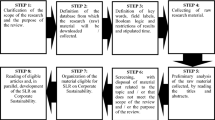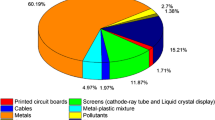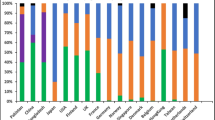Abstract
Selecting operation alternatives for processing a recycling job is an important decision in managing e-waste recycling operations. This paper develops a novel approach to making selection decisions for e-waste recycling operations based on their sustainability performance under environmental, economic, and social dimensions. This approach addresses two new and important issues under a new selection problem structure. A job-oriented assessment method with a fuzzy knowledge base is constructed to address the first issue of how to consistently assess the performance of operation alternatives for a given recycling job with the precise or imprecise specification of the job attributes. A sustainability-based optimal weighting model is developed to address the second issue of how to determine optimal weighting for the three sustainability dimensions to reflect the company’s sustainability concerns and priorities under specific operational settings. With the assessment method and the optimal weighting model, the overall sustainability performance of each operation alternative for a given recycling job can be obtained, on which the selection decision can be made. To examine the effectiveness of the approach, an empirical study on an e-waste operation alternatives selection problem of an Australian e-recycler is conducted. The job-oriented sustainability-based selection approach significantly enhances the efficiency, consistency, and sustainability of processing e-waste recycling jobs.





Similar content being viewed by others
References
Atlee, J., & Kirchain, R. (2006). Operational sustainability metrics assessing metric effectiveness in the context of electronics-recycling systems. Environmental Science & Technology, 40(14), 4506–4513.
Buckley, J. J. (1985). Fuzzy hierarchical analysis. Fuzzy Sets and Systems, 17(3), 233–247.
Chang, Y.-H., Yeh, C.-H., & Cheng, J.-H. (1998). Decision support for bus operations under uncertainty: A fuzzy expert system approach. Omega, 26(3), 367–380.
Chang, Y.-H., Yeh, C.-H., & Wang, S.-Y. (2007). A survey and optimization-based evaluation of development strategies for the air cargo industry. International Journal of Production Economics, 106(2), 550–562.
Chang, Y.-H., & Yeh, C.-H. (2001). Evaluating airline competitiveness using multiattribute decision making. Omega, 29(5), 405–415.
De Feo, G., & De Gisi, S. (2014). Using MCDA and GIS for hazardous waste landfill siting considering land scarcity for waste disposal. Waste Management, 34(11), 2225–2238.
Deng, H. P. (1999). Multicriteria analysis with fuzzy pairwise comparison. International Journal of Approximate Reasoning, 21(3), 215–231.
Elkington, J. (1998). Cannibals with Forks: The triple bottom line of 21st century business. Gabriola Island: New Society Publishers.
Foulds, L. R., & Partovi, F. Y. (1998). Integrating the analytic hierarchy process and graph theory to model facilities layout. Annals of Operations Research, 82(1–4), 435–451.
Kao, C., & Liu, S.-T. (2003). A mathematical programming approach to fuzzy efficiency ranking. International Journal of Production Economics, 86(2), 145–154.
Kaufmann, A., & Gupta, M. M. (1991). Introduction to fuzzy arithmetic, theory and applications. Boston: International Thomson Computer Press.
Kleindorfer, P. R., Singhal, K., & Van Wassenhove, L. N. (2005). Sustainable operations management. Production and Operations Management, 14(4), 482–492.
Klir, G. R., & Yuan, B. (1995). Fuzzy sets and fuzzy logic theory and applications. Upper Saddle River, NJ: Prentice-Hall.
Li, X., & Zhang, Q. (2015). AHP-based resources and environment efficiency evaluation index system construction about the west side of Taiwan Straits. Annals of Operations Research, 228(1), 97–111.
Li, Y., Duan, Y.-P., Huang, F., Yang, J., Xiang, N., Meng, X.-Z., et al. (2014). Polybrominated diphenyl ethers in e-waste: Level and transfer in a typical e-waste recycling site in Shanghai, Eastern China. Waste Management, 34(6), 1059–1065.
Mamdani, E. H., & Assilian, S. (1975). An experiment in linguistic synthesis with a fuzzy logic controller. International Journal of Man-Machine Studies, 7(1), 1–13.
Negoita, C. (1985). Expert systems and fuzzy systems. Menlo Park, CA: Benjamin-Cummings Pub. Co.
Ongondo, F. O., Williams, I. D., & Cherrett, T. J. (2011). How are WEEE doing? A global review of the management of electrical and electronic wastes. Waste Management, 31(4), 714–730.
Pérez, J. C., Carrillo, M. H., & Montoya-Torres, J. R. (2015). Multi-criteria approaches for urban passenger transport systems: A literature review. Annals of Operations Research, 226(1), 69–87.
Pinto, V. N. (2008). E-waste hazard: The impending challenge. Indian Journal of Occupational and Environmental Medicine, 12(2), 65–70.
Prahinski, C., & Kocabasoglu, C. (2006). Empirical research opportunities in reverse supply chain. Omega, 34(6), 519–532.
Rahman, S., & Subramanian, N. (2012). Factors for implementing end-of-life computer recycling operations in reverse supply chains. International Journal of Production Economics, 140(1), 239–248.
Rakhshan, S., Kamyad, A., & Effati, S. (2015). Ranking decision-making units by using combination of analytical hierarchical process method and Tchebycheff model in data envelopment analysis. Annals of Operations Research, 226(1), 505–525.
Rezaei, J., & Dowlatshahi, S. (2010). A rule-based multi-criteria approach to inventory classification. International Journal of Production Research, 48(23), 7107–7126.
Ross, T. J. (2010). Fuzzy logic with engineering applications (3rd ed.). United Kingdom: Wiley.
Roychowdhury, S., & Pedrycz, W. (2001). A survey of defuzzification strategies. International Journal of Intelligent Systems, 16(6), 679–695.
Saaty, T. L. (1980). The analytic hierarchy process. New York: McGraw-Hill.
Saaty, T. L. (2008). Decision making with the analytic hierarchy process. International Journal of Services Sciences, 1(1), 83–98.
Sanchez-Lopez, R., Bana e Costa, C., & Baets, B. (2012). The MACBETH approach for multi-criteria evaluation of development projects on cross-cutting issues. Annals of Operations Research, 199(1), 393–408.
Singh, R. K., Murty, H. R., Gupta, S. K., & Dikshit, A. K. (2012). An overview of sustainability assessment methodologies. Economical Indicators, 15(1), 281–299.
Tavana, M., Sodenkamp, M., & Suhl, L. (2010). A soft multi-criteria decision analysis model with application to the European Union enlargement. Annals of Operations Research, 181(1), 393–421.
Tavana, M., Khalili-Damghani, K., & Rahmatian, R. (2014). A hybrid fuzzy MCDM method for measuring the performance of publicly held pharmaceutical companies. Annals of Operations Research, 226(1), 589–621.
Uricchio, V. F., Giordano, R., & Lopez, N. (2004). A fuzzy knowledge-based decision support system for groundwater pollution risk evaluation. Journal of Environmental Management, 73, 189–197.
Vreeker, R., Nijkamp, P., & Welle, C. T. (2002). A multicriteria decision support methodology for evaluating airport expansion plans. Transportation Research Part D: Transport and Environment, 7(1), 27–47.
Wallenius, J., Dyer, J. S., Fishburn, P. C., Steuer, R. E., Zionts, S., & Deb, K. (2008). Multiple criteria decision making, multiattribute utility theory: Recent accomplishments and what lies ahead. Management Science, 54(7), 1336–1349.
Widmer, R., Oswald-Krapf, H., Sinha-Khetriwal, D., Schnellmann, M., & Boni, H. (2005). Global perspectives on e-waste. Environmental Impact Assessment Review, 25(5), 436–458.
Williams, E., Kahhat, R., Allenby, B., Kavazanjian, E., Kim, J., & Xu, M. (2008). Environmental, social, and economic implications of global reuse and recycling of personal computers. Environmental Science & Technology, 42(17), 6446–6454.
Xu, Y., & Yeh, C.-H. (2012). An integrated approach to evaluation and planning of best practices. Omega, 40(1), 65–78.
Yeh, C.-H., Willis, R. J., Deng, H., & Pan, H. (1999). Task oriented weighting in multi-criteria analysis. European Journal of Operational Research, 119, 130–146.
Yeh, C.-H., & Kuo, Y.-L. (2003). Evaluating passenger services of Asia-Pacific international airports. Transportation Research Part E: Logistics and Transportation Review, 39(1), 35–48.
Yeh, C.-H., & Xu, Y. (2013a). Managing critical success strategies for an enterprise resource planning project. European Journal of Operational Research, 230, 604–614.
Yeh, C.-H., & Xu, Y. (2013b). Sustainable planning of e-waste recycling activities using fuzzy multicriteria decision making. Journal of Cleaner Production, 52, 194–204.
Zadeh, L. A. (1965). Fuzzy sets. Information and Control, 8, 338–353.
Zadeh, L. A. (1975a). Fuzzy logic and approximate reasoning. Synthese, 30, 407–428.
Zadeh, L. A. (1975b). The concept of a linguistic variable and its application to approximate reasoning. Information Sciences, 8, 199–249.
Acknowledgments
This research was funded by the Australian Government’s Enterprise Connect—Researchers in Business Project. We are grateful to the editor and the anonymous referees for their valuable comments and suggestions.
Author information
Authors and Affiliations
Corresponding author
Rights and permissions
About this article
Cite this article
Xu, Y., Yeh, CH. Sustainability-based selection decisions for e-waste recycling operations. Ann Oper Res 248, 531–552 (2017). https://doi.org/10.1007/s10479-016-2269-2
Published:
Issue Date:
DOI: https://doi.org/10.1007/s10479-016-2269-2




